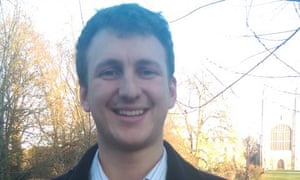Cambridge University asks Facebook for evidence about role of academic
Institution wants Facebook to confirm Aleksandr Kogan used no university data, resources or facilities to pass data to Cambridge Analytica
Cambridge University has announced it is looking more closely into the activities of Aleksandr Kogan, the academic embroiled in the scandal over the use of Facebook data by the political consultancy Cambridge Analytica.
The university said it had asked Facebook to provide “all relevant evidence” about Kogan in relation to his involvement with the company’s data that may later have been passed to Cambridge Analytica.
Kogan has been banned from Facebook amid accusations he was involved in gathering the personal data of millions of Facebook users through an app without their knowledge.
The university said Kogan had not been suspended from his Cambridge role and was “continuing with his academic research”.
In a statement, Cambridge admitted it had given Kogan permission to work with St Petersburg University, but was careful to emphasise that the project was separate from his work at Cambridge, where he was a researcher in the psychology department.
The university also sought to make clear that it had no connection with Cambridge Analytica.
“We are aware that Dr Kogan established his own commercial enterprise, Global Science Research (GSR). We have previously sought and received assurances from Dr Kogan that no university data, resources or facilities were used as the basis for his work with GSR or the company’s subsequent work with any other party,” the university said.
“The University of Cambridge takes matters of research integrity and data protection extremely seriously. We have, to date, found no evidence to contradict Dr Kogan’s previous assurances. Nevertheless, we are writing to Facebook to request all relevant evidence in their possession.”
According to his CV on Cambridge’s website, Kogan graduated from the University of California, Berkeley in 2008, and completed a doctorate at Hong Kong University in 2011. He held a post-doctoral fellowship at the University of Toronto before joining Cambridge in 2012.
The CV lists his Cambridge post as university lecturer (assistant professor) in the psychology department from 2012 onwards, as well as being director of the Cambridge pro-sociality and wellbeing laboratory.
“Alex’s research interests are broadly centred on the biological, contextual, cultural and experiential forces that shape human kindness and wellbeing,” according to the laboratory’s profile.
A university spokesperson said it was common for Cambridge academics to have outside business interests, “but they must satisfy the university that these are held in a personal capacity and that there are no conflicts of interest”.
“Researchers could also undertake external academic research provided it did not interfere with their university duties,” the spokesperson said.
“We understand that Dr Kogan correctly sought permission from his head of department at the time to work with St Petersburg University; it was understood that this work and any associated grants would be in a private capacity, separate to his work at the University of Cambridge.
“Finally, we would like to make it clear that, despite its name, Cambridge Analytica has no connection or association with the University of Cambridge whatsoever.”
Kogan has said he is confident that everything done was legal. He has said he does not believe his research team misused the Facebook permissions and that collaboration ended 2014.
Cambridge’s statement said Kogan was also known by the married name of Spectre, which is noted on his CV with the comment: “Before my marriage, I published under the name Aleksandr Kogan.”
Christopher Wylie, a whistleblower who had worked with Cambridge Analytica, has said personal information obtained from Facebook using the app was passed on to the company without users’ knowledge.

Geen opmerkingen:
Een reactie posten
Opmerking: Alleen leden van deze blog kunnen een reactie posten.